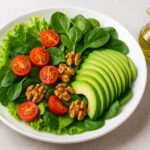## Eating Habits to Improve Sleep for Students During Exam Preparation
Finding the right diet to improve sleep for students during exam preparation is always a concern for many parents and students alike. During this crucial period, if students experience insomnia, it can lead to serious health consequences, including physical and mental fatigue, impairing their ability to work and study effectively.
### 1. Prioritize Tryptophan-Rich Foods to Enhance Sleep Quality:
Tryptophan is an essential amino acid that our body absorbs from food. In the brain, tryptophan is converted into serotonin and melatonin, which play a vital role in regulating sleep. Melatonin supports the onset of sleep and maintains stable sleep throughout the night, while serotonin induces relaxation and contributes to the body’s natural sleep-wake cycle.
Foods rich in tryptophan are easily incorporated into your daily diet and include almonds, barley, brown rice, chia seeds, lentils, oatmeal, pumpkin seeds, salmon, tofu, chicken, walnuts, and yogurt. However, consuming these foods does not provide immediate effects on sleep improvement. For optimal benefits, maintain a balanced diet and regularly include tryptophan-rich foods to sustainably enhance sleep quality.
### 2. Improve Your Diet with Fruits and Vegetables for Better Sleep:
One effective eating habit for students to enhance sleep quality is to increase their intake of fruits and vegetables. It is recommended to prioritize a variety of vegetables in daily meals and replace processed or refined foods with fresh fruits to promote better sleep.
Greens and fruits are excellent sources of essential micronutrients like magnesium, vitamin B6, and folate. These nutrients are crucial in stimulating the body’s production of melatonin, the primary hormone that regulates the sleep-wake cycle, helping to maintain stable and deeper sleep.
Additionally, fruits and vegetables are high in fiber. Research indicates that a high-fiber diet is associated with improved sleep quality, resulting in more profound and uninterrupted sleep.
Furthermore, replacing processed foods with fruits and vegetables reduces the consumption of refined carbohydrates and added sugars, which can disrupt sleep patterns. Maintaining a healthy diet with these food groups is not just a short-term fix for better sleep but also offers long-term benefits for overall health.

### 3. Limit Caffeine Intake in the Afternoon and Evening:
Many people in Vietnam have a habit of consuming coffee, tea, or energy drinks to stay alert during the day. However, the caffeine in these beverages can negatively affect sleep quality. Caffeine has an average half-life of about 6 hours in the body, meaning if you drink a cup of coffee, tea, or an energy drink at 5 pm, half of the caffeine will still be in your system by 11 pm.
Consuming caffeine later in the day can significantly reduce the duration and quality of deep sleep. Studies indicate that drinking approximately 400 mg of caffeine (equivalent to two cans of energy drink) 6 hours before bedtime can result in a loss of about 1 hour of total sleep time. To protect your sleep, healthcare professionals advise limiting caffeine intake after 2 pm, giving your body sufficient time to eliminate the substance and maintain restful sleep.
### 4. Avoid Eating a Large Meal Close to Bedtime:
Consuming a large meal right before bedtime can negatively impact sleep quality. At night, digestion slows down, and lying down immediately after a heavy meal can lead to health issues such as heartburn or acid reflux. To ensure comfortable and uninterrupted sleep, it is recommended to stop eating a few hours before bedtime, allowing your body to complete the digestion process.
However, it is also essential not to go to bed hungry, as this can cause discomfort and make it challenging to fall asleep. According to Doctor Nguyen Huy Hoang, an ideal light snack, about 30 minutes before bedtime, with approximately 150 calories and nutritious content, is a suitable choice. Recommended snacks include a banana, a yogurt, a boiled egg, or some cereal. These options not only prevent hunger but also promote deeper and more restful sleep.
Adopting these healthy eating habits can significantly improve sleep quality, helping students maintain alertness and focus during exam preparation. Prioritizing tryptophan-rich foods, increasing fruit and vegetable intake, limiting caffeine after 2 pm, and avoiding large meals close to bedtime not only enhance sleep quality but also improve overall health. Incorporating these scientific eating habits into your daily routine will help you achieve optimal mental and physical conditions, ready to take on any challenges during exam season.
Does Matcha Make You More Alert Than Green Tea? The Answer May Surprise You
Matcha is the latest beverage trend taking the world by storm, but does it live up to the hype? With a plethora of purported health benefits and a promise of enhanced focus and alertness, it’s time to delve into the world of matcha and uncover the truth. Uncover the secrets of this ancient beverage and discover why it might just be your new go-to drink.








































